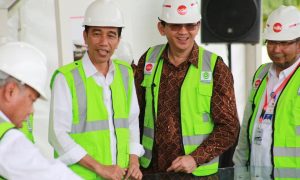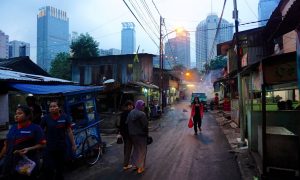Indonesia’s year of democratic setbacks: toward a new era of deepening illiberalism?
Canberra 15 September 2017 | Speaker Prof Vedi Hadiz, University of Melbourne | Discussant Tom Power, ANU
ABSTRACT Debates about Indonesian democracy have centred on whether institutional reforms have significantly altered the balance between competing social forces. A contentious issue is whether oligarchy still presides over Indonesian democracy, two decades following the fall of the New Order. But it is difficult to deny that there have been conspicuous setbacks over the past year in relation to Indonesian democracy’s capacity to protect social rights, including some of the more vulnerable members of society. Analyses of Indonesian politics have become more sombre, especially since the defeat of Basuki Purnama (Ahok) in the Jakarta gubernatorial race, through a bitter contest that involved the mobilisation of Islamic identity in a series of mass demonstrations. Some have now reverted to older fears about how radical Islam threatens to overwhelm Indonesian democracy. Yet, we also see the resurgence of a conservative form of state nationalism, reminiscent of the New Order. Are we entering a new era in which long-existing illiberal tendencies become accentuated through nationalist as well as religious hyperbole, thus resulting in the further relegation of rights to the evolving imperatives of intra-oligarchic competition?
VEDI HADIZ is Professor of Asian Studies and Deputy Director at the Asia Institute, University of Melbourne. An Indonesian national, he received his PhD at Murdoch University in 1996. His research is in the broad areas of political economy and political sociology and covers Indonesia, Southeast Asia and the Middle East. He has taught at the National University of Singapore, Murdoch University and the University of Melbourne. He has held visiting positions in Indonesia, Australia, the Netherlands, Japan and France. He is an Adjunct Professor of Sociology at Universitas Indonesia. Among his books are Islamic populism in Indonesia and the Middle East (Cambridge University Press 2016), Localising power in Indonesia: a Southeast Asia perspective (Stanford University Press 2010) and, with Richard Robison, Reorganising power in Indonesia: the politics of oligarchy in an age of markets (Routledge 2004).
TOM POWER completed his Bachelor of International Studies (Hons) at the University of Queensland, where he was also awarded the University Medal in 2013. He commenced his PhD candidature at The Australian National University’s Department of Political and Social Change in 2014, and was awarded an Endeavour Research Scholarship the same year. His PhD research looks at the effects of alternation in government upon Indonesia’s post-authoritarian political parties, with a particular focus on political patronage and party change. He conducted his PhD fieldwork in Indonesia from February 2015 until June 2016. Tom has previously worked with the Education Department of Central Java (Dinas Pendidikan Jawa Tengah). He is an alumnus of the Australia-Indonesia Youth Exchange Program (AIYEP), and he also undertook the Australian Consortium for In-Country Indonesian Studies (ACICIS) field research program at Universitas Muhammadiyah Malang in 2012.
 Facebook
Facebook  Twitter
Twitter  Soundcloud
Soundcloud  Youtube
Youtube  Rss
Rss 

